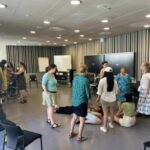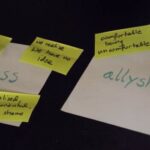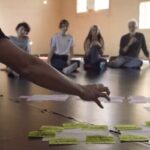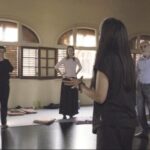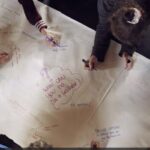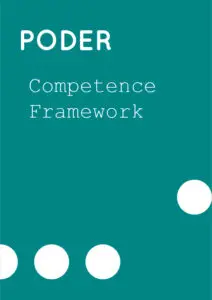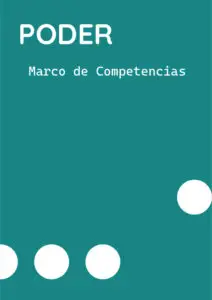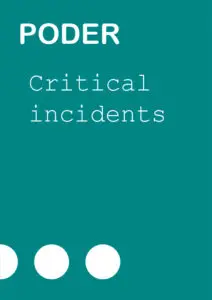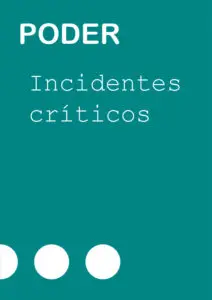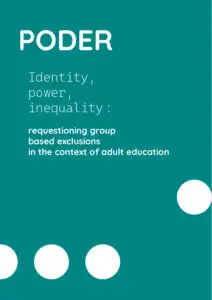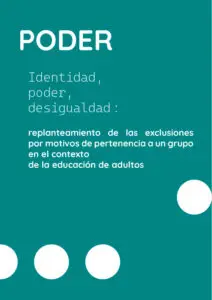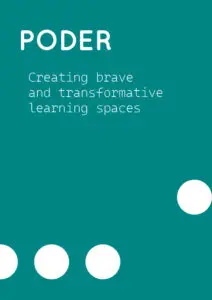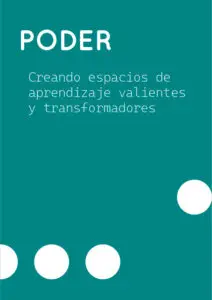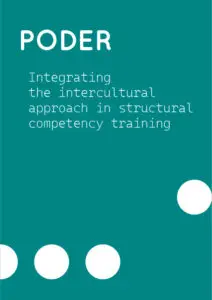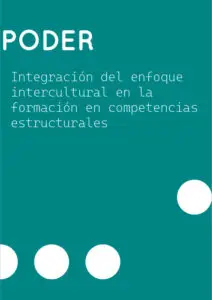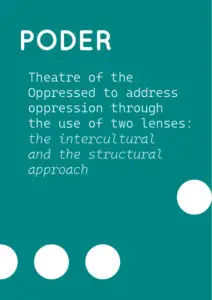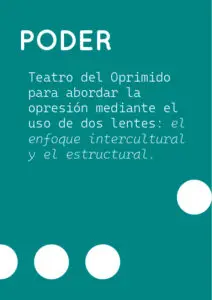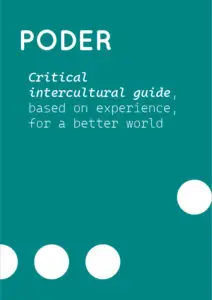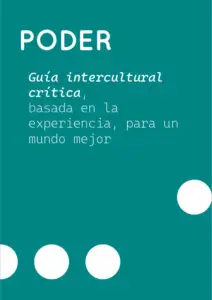PODER – Power Dynamics in Education revisited
The Poder project
PODER – Power Dynamics in Education revisited is a project that aims to explore power relations in adult education. Our aim is to identify the power relations that may exist in a training course (age/gender/class/social race/etc) and to understand how they can potentially generate tensions between trainers and participants. PODER co-constructs pedagogical tools based on popular education and the theatre of the oppressed to develop skills to understand and decode these conflicts.
The project Poder – Power Dynamics in Education Revisited was funded by the ERASMUS plus programme (KA2 – Cooperation for innovation and exchange of good practice KA204 – Strategic partnerships for adult education).
PARTNERS
Elan Interculturel (France) / Artemisszio (Hungary) / Giolli (Italy) / UPorto (Portugal)
PERIOD
2022-2024
FOR WHOM?
Adult educators
KEY RESOURCES
1. Competence framework and its annex with a collection and analysis of 40 incidents related to power and hierarchy in adult education.
Competences are often conceptualized as the sum of three different levels of psycho-social resources: skills (behaviour level), attitudes (emotional or motivational level) and knowledge (cognitive level). A competence framework basically helps to give a precise answer to the question of what professionals really need to develop as skills, attitudes or knowledge in order to face specific demands. In the case of the PODER project these are: demands related to the presence and impact of power relations and hierarchies in adult education. Our competence framework is derived from the collection of critical incidents experienced by adult educators and learners in France, Hungary, Italy and Spain. These were situations where the protagonists faced some challenge that could be related to power dynamics or hierarchy – either individual or based on groups. We used the incidents to identify and systematize these challenges so that we could identify the competencies needed to overcome them.
Critical incident annex is our collection of what we termed as “power shocks” i.e. critical incidents that arise from different expectations and conceptions concerning power relations, hierarchy and how they should be treated. We relied on Margalit Cohen Emerique’ definition of “critical incidents” : Experiences of individuals who interact with others who have different norms, values and representations and as a result they experience an emotional reaction that points to surprises, misunderstandings or conflicts.
2. Identity, power, inequality: requestioning group based exclusions in the context of adult education.
Reader with vocabulary about different forms of discriminations and oppressions: sexism, racism, classism etc.
The collection of essays in this reader was written in the framework of the PODER project, whose mission was to explore how differences in power, status, and hierarchy influence adult education activities, such as a theatre workshop, a cooking class, a French lesson etc. Concerns related to power and hierarchy can emerge at least in three different ways. Individual status differences tend to arise in any group. Some individuals acquire more status than others, with respect to the relevant activity of the group: one student who proves to be a more talented actor, who spontaneously has an impeccable French accent, or who’s always ready to give a hand to others in their tasks. There are also individual and/or cultural preferences: some of us attribute more importance and respect to status or hierarchy. For instance, some students will hesitate to ask questions or express their disagreement from fear of failing to show proper respect to the educator, while others will be inclined to counter the educator precisely because of their hierarchical role. Finally, learners and educators have a specific perceived status simply because they belong to specific social groups – based on age, gender, sexual orientation, nationality, religion etc. These differences tend to create unfair distinctions and inequalities, inside but also outside the classroom – distinctions which are not always understandable by those who do not experience discrimination. The purpose of our reader is to offer some background information that concerns such group-based hierarchization. In this introduction we briefly explain where these hierarchizations originate from, why we feel they can cause suffering, and how we could work to reduce its negative impacts.
3. Toolkit for Creating Brave and Transformative Learning Spaces.
Guide containing tools to educators to create a positive climate for participants of all groups without replicating existing social oppressions accompanied with 5 videos on tools.
When holding educational activities, the creation of a suitable, supportive environment for learners is essential. Each learner will come with their own set of experiences, identities and history related to the topic – emerging group dynamics will influence and shape the environment. Educators should be aware of these dynamics in order to support everyone’s learning journeys. However, exploring dynamics in educational spaces can be a challenging task. These conversations can bring up strong emotions and reactions. Social identity aspects such as race, sexuality, gender, economic status, ability are at play in any group setting (whether we are conscious of it or not). It requires skills and knowledge to be able to work with and address power dynamics in a way that feels transformative and supportive to participants, rather than daunting and reinforcing emotions of guilt and shame.
This toolkit is aimed at adult educators to guide them in creating a strong and solid group container to encourage participants to tackle arising power dynamics by stepping into uncomfortable conversations with courage and care.
These videos are with subtitles (french, spanish, hungarian, italian subtitles) and they accompany the toolkit for deeper understanding of 5 key concepts and tools. In the videos there are also shorter version of session plans for educators to apply them in their trainings. You can visit the video playlist by clicking the video below or here
4. Guide for change.
Guide to help educators Integrating the intercultural approach in structural competency training.
One important objective of the Poder project is to examine if it is possible to use Cohen-Emerique’s critical incident methodology to understand and overcome conflicts around group-based power hierarchies in the training room, combining the intercultural approach with the theoretical foundation of the Structural Competency school. We therefore set out to create a training integrating both approaches. We expect from the combined training that it will help participants look at social conflicts in a new way, taking into consideration their intercultural dimension on the one hand, and their structural determinations, on the other hand. The underlying hypothesis is that this new knowledge and set of competences will give them tools to help them start working towards some ethically and practically positive outcome, within the narrow context of the conflict situation, or beyond it. What the positive outcome may be is not obvious: it must be reflected upon in each situation, balancing between the double ethical exigences of the intercultural and the structural ways of looking at the world. Ideally, outcomes should obey four principles: 1. justice, 2. recognition (respecting the identities and sensitivities of the actors in the situation) 3. mutual acceptability (opening ways towards a feasible and acceptable solution for all parties), and 4. common good (contributing to, or at least not diminishing the benefit for all, or most members of the collective in the largest sense).
5. Theatre-based training videos and manual.
Series of videos that propose theatre of the oppressed as a tool to explore power relationships in adult education settings and search for possible solutions.
This manual is aimed at individuals interested in incorporating at people intent on bringing the use of Theater of the Oppressed (TO) into their work or life environments by integrating it into a broader reflection on the intercultural and structural approaches.
This toolkit complements and deepens the content presented with what you can see in the three videos that make up this work.
6. Experience-based Critical Intercultural Guide.
Guide that aims at empowering learners to make visible the impact of power dynamics on their subject matter.
The final outcome of PODER consists of a guide to enrich education activity by raising awareness of the power relations in learners’ lives. An intercultural critical approach is brought into the learning process (whatever the subject of teaching), empowering teachers and learners to reflect and act upon power relations on their subject matter. Motivation to work towards greater equality in their lives emerges from Freirean popular education.
The PODER project “Power dynamics in education revisited” is an Erasmus+ strategic partnership.

